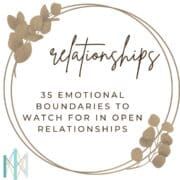
Emotional boundaries are often the most subtle—and most essential—part of maintaining healthy open or polyamorous relationships. While physical boundaries (like time, touch, or space) are more tangible, emotional boundaries define your inner world: your values, your energy, your self-respect, and your emotional safety.
In polyamorous dynamics, it’s easy for emotional boundaries to blur. You may feel pulled between multiple people’s needs, unsure of where to draw the line, or afraid of seeming “too much” for needing space or clarity. But strong emotional boundaries don’t limit love—they protect it.
This post outlines 35 emotional boundary indicators that can help you recognize when your emotional well-being is being respected—and when it might be time to recalibrate.
Whether you’re new to non-monogamy or deeply immersed in it, these boundary cues can offer valuable reflection and support.
Learn more about therapy for open relationships.
Why Emotional Boundaries Matter in Non-Monogamy
In open relationships, there’s often more communication, more moving parts, and more emotional labor than in monogamous systems. When boundaries aren’t clear, you may find yourself feeling:
- Drained, resentful, or overextended
- Responsible for other people’s emotions or regulation
- Confused about your role in a dynamic
- Afraid to name your needs or limits
- Overwhelmed by complex feelings like jealousy, guilt, or pressure
Emotional boundaries help create clarity and sustainability in relationships. They define:
- What you’re available for emotionally (and what you’re not)
- How much processing or support you’re willing to offer
- What kinds of conversations or behaviors feel respectful
- What you need to feel safe, seen, and sovereign
Without these boundaries, open relationships can start to feel like emotional overload zones. With them, your relationships can become more nourishing, honest, and aligned.
35 Emotional Boundaries to Reflect On
Below are 35 signs—organized by theme—that may indicate your emotional boundaries are being crossed, or that you may need to reinforce them more intentionally.
Emotional Labor & Over-Responsibility
In open relationships, emotional labor can become intense. With more people involved, it’s easy to take on the role of caretaker, mediator, or emotional sponge without realizing it. Over time, this can lead to burnout, resentment, or emotional depletion.
- You’re expected to process every emotional shift your partner has with others. Your partner may come to you after every date, interaction, or conversation with another partner expecting you to help them regulate. While sharing is healthy, being someone’s default processor can blur your own emotional limits.
- You feel guilty when you need space from someone else’s emotional processing. Taking space isn’t rejection—it’s regulation. If you find yourself apologizing for needing emotional rest, this might be a boundary to reevaluate.
- You regularly take on the role of mediator between others in your polycule. When there’s conflict in the broader relationship network, you may feel pressure to hold everyone together. That role may not be yours to hold, especially if it’s at the expense of your own peace.
- You’re afraid to say “I don’t have the capacity for this right now.” Emotional availability has limits. If saying “no” or “not now” feels dangerous or like it will destabilize the relationship, it might be time to revisit emotional agreements.
- You’re expected to be “the calm one” even when you’re hurting too. If your role in the relationship is being the emotionally stable anchor at all times, you may be internalizing the idea that your feelings are less valid or urgent than others’.
Communication Overwhelm
Polyamory values communication, but sometimes it becomes overcommunication. Without boundaries, communication can shift from supportive to exhausting.
- You feel pressure to talk through everything, even when you’re exhausted. Processing every emotion and incident can be helpful—but not if it overrides your need for rest or reflection.
- Your need for silence or downtime is interpreted as withdrawal or disconnection. If quiet time is seen as a threat, you may feel compelled to over-explain or perform constant emotional availability.
- You’re shamed for not always responding with “compersion.” Compersion—joy in your partner’s joy—is beautiful but not mandatory. Feeling neutral, complex, or even jealous is human.
- You’re expected to always be available for deep conversations, even during inconvenient times. Late-night calls, urgent texts, or mid-workday heart-to-hearts can feel draining if you’re expected to drop everything.
- You avoid naming your needs because of fear it will “rock the boat.” When emotional harmony is prioritized over honesty, needs stay unspoken and relationships stagnate.
Autonomy & Self-Connection
Staying connected to yourself is vital in non-monogamy. When you’re regularly tuning into others, it’s easy to lose your own emotional compass.
- You lose track of your own emotional state because you’re focused on others. You might know exactly how your partner is feeling but struggle to name your own emotional experience.
- You cancel your own plans to emotionally support someone else. Consistently sidelining your life for another person’s crisis can erode your autonomy.
- You feel pressure to override your intuition to “keep things smooth.” That gut feeling—”this doesn’t feel right”—might get dismissed in favor of maintaining emotional peace.
- Your alone time gets regularly interrupted or questioned. Time alone is not a luxury—it’s an emotional need. If it’s seen as withdrawal or neglect, that boundary needs reinforcing.
- You feel uncomfortable setting emotional boundaries for fear of being “selfish.” Polyamory values generosity, but it shouldn’t come at the cost of your inner stability.
Jealousy & Comparison
Even in polyamory, jealousy is real. If you feel pressured to suppress or invalidate your emotional responses, boundaries may be needed.
- You’re told jealousy means you’re not poly enough. Feeling jealous doesn’t disqualify you from non-monogamy. It means you’re human.
- You feel like you have to suppress your emotional reactions to be accepted. If you’re scared to share disappointment, fear, or sadness, that’s a boundary signaling unmet emotional safety.
- Your feelings are minimized as “insecurity” rather than explored with care. Being called “insecure” might shut down real emotional concerns that deserve curiosity.
- You’re compared—directly or indirectly—to metamours. Comparisons can erode your sense of worth and connection.
- You’re discouraged from expressing needs for reassurance or emotional repair. If asking for support is seen as weakness, that’s a red flag in any relationship structure.
Emotional Consent & Safety
Your emotional availability should be offered, not assumed. Just like physical consent, emotional consent is a foundation of healthy relational dynamics.
- You’re asked to process with someone before you’re ready. Emotional timing matters. Being pushed to respond immediately can bypass your internal readiness.
- Your emotional boundaries are labeled as “walls” or “blockages.” Language like this may dismiss legitimate emotional self-protection.
- You feel manipulated into giving support you didn’t offer. This could show up as guilt-tripping, passive pressure, or unspoken expectations.
- You’re not allowed to say “I’m not okay with this emotional dynamic.” Being able to name when something feels off is a baseline need in emotionally safe relationships.
- You feel emotionally obligated to care for partners who consistently disregard your feelings. Love shouldn’t override emotional self-respect. Boundaries help protect your inner world.
Agreements & Repair
Healthy relationships involve repair and mutual accountability. When that’s missing, emotional boundaries can feel one-sided.
- Boundaries you’ve named are often forgotten, tested, or dismissed. If you feel like you have to keep reminding others of what you’ve already clearly expressed, that boundary is not being honored.
- Apologies are given without meaningful behavioral change. Sorry is a start—but repair requires action.
- You’re pressured to “move on” before you feel ready. Emotional repair is not a race. If you’re being rushed to forgive or pretend everything is okay, you’re not being emotionally met.
- You feel punished (with distance or silence) for asserting a need. This could look like someone pulling away, becoming cold, or withdrawing care after you’ve asked for something.
- Conflict resolution always falls on your shoulders. If you’re the one initiating every repair, your emotional labor may not be reciprocated.
Subtle Pressure or Control
Not all boundary violations are overt. Sometimes the pressure is subtle—but still impactful.
- You feel emotionally punished for taking space. After asserting a boundary, your partner may become cold or distant, even if they don’t say anything outright.
- Others expect you to understand and accept their choices immediately. You’re allowed time to feel, react, and reflect—especially around changes that affect you.
- You’re gaslit or made to feel irrational when hurt. This can sound like: “You’re overreacting,” “You’re too sensitive,” or “That wasn’t a big deal.”
- You’re pressured to be emotionally available beyond your capacity. If someone pushes you to engage when you’re depleted, it signals a disregard for your limits.
- You’re afraid to express limits because of fear you’ll lose connection. If stating a boundary feels like it will cost you the relationship, that fear needs tending—in therapy or through conscious community support.
These boundaries aren’t rules to impose on others—they’re signals to help you recognize where your limits are, and how to protect your emotional integrity within the relationships you care about.
How Therapy Helps You Rebuild and Reinforce Emotional Boundaries
Working with a therapist—especially one trained in relational diversity and trauma-informed care—can help you untangle the root of your boundary challenges.
In therapy, you might:
- Identify parts of you that struggle to say no or fear abandonment
- Learn nervous system regulation tools to tolerate discomfort when asserting limits
- Role-play or rehearse hard conversations before having them in real life
- Explore cultural, familial, or systemic conditioning that shaped your relationship to boundaries
- Reframe boundary-setting as a gift to your relationships—not a threat
Modalities like Internal Family Systems (IFS), Somatic Therapy, or Mindfulness-Based Therapy can help you reconnect with your internal signals, learn to trust your own emotional truth, and express it in ways that are grounded and compassionate.
Emotional Boundaries Make More Space for Love—Not Less
One of the biggest myths about polyamory is that more love means fewer limits. But love without boundaries becomes unsustainable. The most honest, fulfilling relationships are the ones where everyone feels emotionally safe to show up as their full selves—needs, limits, fears, and all.
You’re allowed to have boundaries. You’re allowed to need space. You’re allowed to say “this doesn’t feel good to me”—and still be deeply polyamorous.
Therapy can help you reclaim that right and find ways to communicate it with clarity, confidence, and care.
Working with a Therapist in the San Francisco Bay Area
The Bay Area is home to a vibrant and visible non-monogamous community. But even in progressive circles, emotional boundaries aren’t always respected—or even understood. You may find yourself surrounded by “communication culture” and still feel lost, overwhelmed, or shut down.
At Center for Mindful Therapy, our Bay Area-based clinicians understand the complexity of navigating boundaries in polyamorous contexts. We offer:
- Trauma-informed support for nervous system regulation and emotional expression
- Culturally responsive care for BIPOC, queer, trans, and neurodivergent clients
- Therapy grounded in mindfulness, somatics, and relational depth
- Experience supporting individuals, couples, and polycules navigating boundaries
You don’t need to carry the emotional weight of your relationships alone. We’re here to support your clarity, care, and capacity.
Browse our Therapist Directory
You Might Also Like to Read:
How to Stop Absorbing Other People’s Emotions: The Difference Between HSP and Codependency





